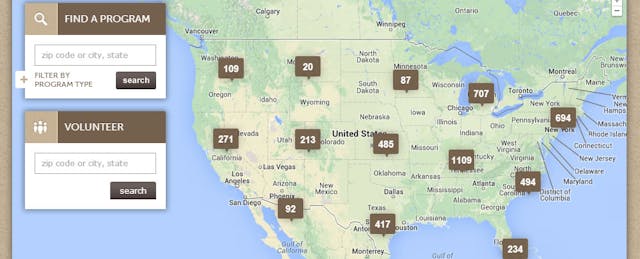In 2010, the National Literacy Directory set out to change the way adult learners access educational resources. The program—brainchild of Kentucky-based National Center for Families Learning (NCFL) and international non-profit ProLiteracy, and made possible through funding from the Dollar General Literacy Foundation—boasts listings of over 10,000 academic organizations and GED-testing centers nationwide, as well as a toll-free number for interested participants who would prefer to obtain referrals to local programs from qualified staff.
With an easy-to-use, intuitive interface and a clean, simple aesthetic, creators of the National Literacy Directory made no assumptions about users’ technological aptitude, ensuring that such an invaluable tools remains accessible to the greatest number of users. For less computer-savvy visitors, the toll-free number for help finding local listings is visible in large font along the bottom of the page. Both web and phone referrals are available twenty-four hours a day, seven days a week.
The purpose of the directory—to facilitate the ability of GED-pursuants, adult-education students, and college-bound hopefuls of any age to access relevant, local information from a single source—is more than achieved through this database. Rather than having to track down educational opportunities one by one, adult learners (who may already be burdened by a lack of familiarity with certain types of technology that might otherwise make this hunt for information more manageable, not to mention diminished time for such a project) have a range of helpful resources in their immediate geographical vicinity, available within a few clicks of a mouse or a single phone call.
Emily Kirkpatrick, Vice President of NCFL, credits this dual-access approach to knowing that “the future of learning and how information is discovered was heading more and more online and even to mobile. We wanted to get ahead of this trend.”
About the launch of the database, Kirkpatrick explains, “We were approached by Dollar General to produce this directory for a number of reasons, including our proven track record for developing innovative online resources that meet literacy and learning needs and because of our already-established connections with literacy programs around the nation. Naturally, we were excited by the idea of creating an online directory to help families more easily locate centers that provide ESL or GED courses, workplace skills, tutoring, and other essential services.”
From the main page of the site, entering a zip code into the search field populates a list of nearby organizations offering programs for adult education, returning learners, or those interested in taking the necessary steps to earn a GED. For example, a zip-code search for programs in the greater Louisville, Kentucky area immediately returns twenty-four educational agencies or GED-testing sites nearby.
Each listing is its own clickable entry and opens an organization-specific pop-up with more detailed information, including the agency’s name, contact info, and an overview of services. At each step of the search process, the National Literacy Directory’s toll-free number is highlighted along the bottom of the screen, reminding visitors that help navigating the website and additional aid in accessing these resources takes only one call.
Founded in 1989, NFCL’s mission is to “inspire families in learning together by creating a culture of engagement across the educational spectrum,” and it’s clear to see how the National Literacy Directory facilitates that ideal.
Kirkpatrick and her colleagues are thrilled with the results they’ve seen since the database was launched four years ago. Shares Kirkpatrick, “The NLD is a modern, one-of-a-kind digital solution for the millions of U.S. adults—and their families—who struggle with low literacy skills, and, in turn, struggle to support their families’ educational and economic needs. The NLD served more than 50,000 potential students and volunteers last year; in January 2014, we re-launched the NLD with significantly enhanced mobile features and design, which includes intuitive symbols, directions, and prompts that cater to all levels of literacy ability.”
Partner organization ProLiteracy agrees, stating on their website, “By connecting adults in need to programs that can help, more people are gaining the skills they need to understand the financial, health care, employment, and legal issues that affect their daily lives.”
The National Literacy Directory is an important and much-needed resource working to realize this connection for our country’s adult learners.
Want to help strengthen the National Literacy Directory? Register here to add your program.


